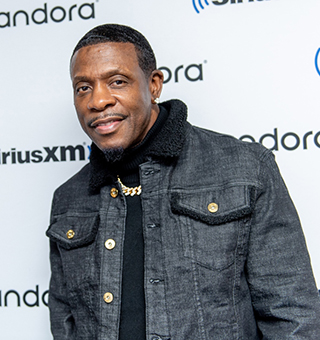Longevity is a blessing for so few artists in the music industry, and those who can remain in the public consciousness may not always do so through the sole vehicle of song. For generations, our favorite performers would find their way onto a screen — silver, plasma, LED or tempered glass — whether as fully-immersed actors or even being themselves in cameo appearances. But sometimes, you could be thrown for a loop to see someone who you enjoyed as a musician trading sound checks in the studio for multiple takes on a stage.
So when we got the heads up that one of the biggest legends in R&B history was taking another turn in front of the camera for the new Tubi movie, Howard High, it was a pleasant surprise. Well, at least for this scribe who had no idea that interviewing one of the smoothest hitmakers ever, Keith Sweat, would be on his bucket list.
Even if you were way too young to fully appreciate what Sweat was crooning about, you definitely felt the vibe when you came of age. From “I’ll Give All My Love To You” to “Twisted” and so much more, Sweat was a towering figure in the new jack swing era of R&B, and his work — a collection of sexuality, romance, heartbreak and style — continues to influence today’s sounds. And just like previous generations of musicians who dipped their toes in other arenas, seeing Sweat on TV or film always brings back those feelings for those who keep his hits as part of their personal soundtracks.
Howard High, directed by Christopher B. Stokes, should be no different. Based on the 2020 miniseries of the same name, the movie is about an underperforming school at risk of closing its doors. However, thanks to its talented performing arts program, the school has a chance to fight for its survival.
Decider had the pleasure to chat with Sweat about much more than his role in Howard High, though the discussion about his involvement in the movie was illuminating on its own. The longtime artist spoke about quitting Wall Street to make music, his mentorship of younger singers, touring in the COVID era, and the state of mainstream R&B in 2022.
DECIDER: All of this time later, did you ever figure out a right or wrong way to love somebody?
KEITH SWEAT: I’m still trying to figure that out. [Laughs]
How did you get involved with Howard High? What made you want to get in front of the camera and not just the mic?
I’ve done a quite of few things in front of the screen. I did this movie that just came out, For The Love Of Money, with Katt Williams and Keri Hilson. I have done quite a few things in front of the camera – I was in front of the camera in New Jack City. I did a few shows on Martin and The Wayan Brothers and that type of stuff, so that was some acting, funny tip though.
I got involved because I go way back with Marques Houston and Chris Stokes. I produced and written songs for Immature so based on that we’ve already known each other by then. Since he knows that lately I’ve been executive producing films and stuff like that. I know he was doing Howard High so we decided to connect with each other.
From the music business, I’ve known him to do up from the music situations we had; we decided to get together and work together on film. That’s basically how it happened. He called me and I fit the role perfectly knowing it’s mentorship. What I’ve done with all the young acts coming up now. They look at me as the OG, so it’s “I want you to come to my video. I want to ask you this question. I want to know this.” So, it’s pretty much the same thing.
It was fascinating to think you were a guy on Wall Street before embarking on a long musical career, taking that leap of faith in late ’70s. What was it that made you say “I can make money in Wall Street, but it’s just not enough, and I want to get myself out there in a different way?”
I couldn’t say it wasn’t enough. My desire, my passion, was to do music. We all have our own desires and dreams of what we want in life and how we want to excel in life. It’s what makes us really happy. I’ve always been into music. I’ve grown up listening to the O’Jays, Norman Connors, you name it and I grew up listening to it. Kool & the Gang, Lionel Richie, Kenny Rogers. When I got the opportunity to do it, of course I was going to jump on it. I wasn’t going to jump 100% all into it because you always have something you got to fall back on in case things don’t work. I realized that I could make a really good living from it.
I did it more so because I enjoyed music and for the passion of it, not because I thought about the money side of it. It was more of I can do this and people will like the songs, like what I’m doing. That’s what made me decide to go forward wholeheartedly with it.
Considering where both the music industry is today, with more niches and more outlets to be heard (or ignored), do you think you could have taken that leap now?
I think I could’ve did it. Why? Because to be able to sustain is like being able to come out in the beginning. There’s a lot of people who have come out and haven’t been able to sustain. My work ethic is so crazy that I’m always trying to find a way to make it in the game that I love.
There’s certain people that keep reinventing themselves. They reinvent themselves to make themselves relevant. For me, it seems to be very easy for me to do because everybody mess with me on the young side and the older side. You just have to know when to hold and when to fold. [Laughs] Everything ain’t for everybody. Everybody ain’t for everything. You got to know when it’s for you and when it’s not for you.
R&B has shifted quite a bit over the years. What do you think about where the genre is at this moment in 2022 and why artists aren’t getting the same acclaim you have? Where do you see the industry right now?
Artists are not getting to my level because the format of video has changed. Back in the day, if I dropped a record, it wasn’t just considered an adult-contemporary record. Now, they classified the music so much more than it was back in the day when I came out. When I dropped “Make It Last Forever,” at Warner I was able to go top ten, at number one pop. The music was not so classified as, “This is a black artist. He’s R&B.” Music was just music. Now everything has its own space. They love R&B and with hip-hop back in the day, they were separate. You had your hip-hop charts, you had your R&B charts. They lumped it all together with hip-hop and R&B, they’re on the same charts. That’s why it’s harder for artists to make it. Like for me, it was easy because they didn’t lump all them together like that.
Who do you check for these days? Who are the ones that really get your attention?
I listen to quite a few people. I’m not familiar with all the names. Of course, you know the Chris Browns, the main ones. It’s quite a few people. I mean, I listen to everybody. It doesn’t matter because you have to listen to different genres of music in order to know what you’re dealing with musically.
It would be interesting to see how your mentorship works as someone trying to break through in the game today. You’re the OG, you worked with so many different musicians, you discovered so many folks we love in the 90s and 2000s. How do you mentor an artist?
I can write for anybody. I can write in any form of music because I’m from the streets. I can write whatever. Music has changed. I can understand because all music now are more direct. Back in the day, you couldn’t say certain things even though you meant certain things. You had to put it in a way the radio could play it. Now everything is just so direct and so blunt. It’s not really no different from the way we probably talk. [Laughs] If I get mad at somebody, you’re going to hear all those words. Nowadays, I could say all those things in the record now. It’s changed only now that people can be more direct.
Do you think something is lost, something is gained by the way the lyrics have changed? By how the sound has changed?
I’m cool with certain words, but (not in) every sentence. That’s the problem I have with every sentence.
When you decided to participate in this film, did the plot resonate with you in how many schools around the country have or are struggling to hold on to their music or art programs?
I think that’s why the film is so good because it just makes reference to what’s happening in most schools right now. They don’t have the money for the arts program or the things that allow the kids to gain more out of school. That’s why the story of the film makes so much sense.
The good thing about it is that people see this and might encourage them. It might give people a sense of “We need to do something about it.” The reason why most of these young kids are acting crazy is because they have nothing to turn to. They need a release, not going to rob the store. They need an outlet, but they don’t have one. If you ain’t got an outlet, what are you going to do but go crazy. You know how life is, they need something to keep them focused. They just have too much time on their hands. When you have too much time on your hands, you get yourself into some trouble.
What did it feel like to step into this role?
Since I’ve done this before, it’s like second nature to me. Acting doesn’t feel no different for me than being on-stage singing a song. Saying it now, I’m acting, talking. When I’m on stage performing, I’m still on stage and I still have to play a certain part, a certain role. When I’m singing, I still have to make people interested in what I’m singing. I still have to engage people while I’m on stage. When you’re acting, you have to engage the person watching you and make them believe you’re that person playing that role. Make them believe this is really happening.
It’s no different than me singing a song and when I put no emotion into it, it’s no good. I really have to impact the song with emotion and feel.
How has it been doing all this work — touring, most especially — in the pandemic?
It hasn’t been challenging for me. When COVID hit, I needed the much needed rest because I’m always on the road. Now, I still tour and it’s not as bad for me as people make it because I still tour. If it gets bad, then we just stay home. But I’m good either way. [Laughs]







__.jpg)
.jpg)

